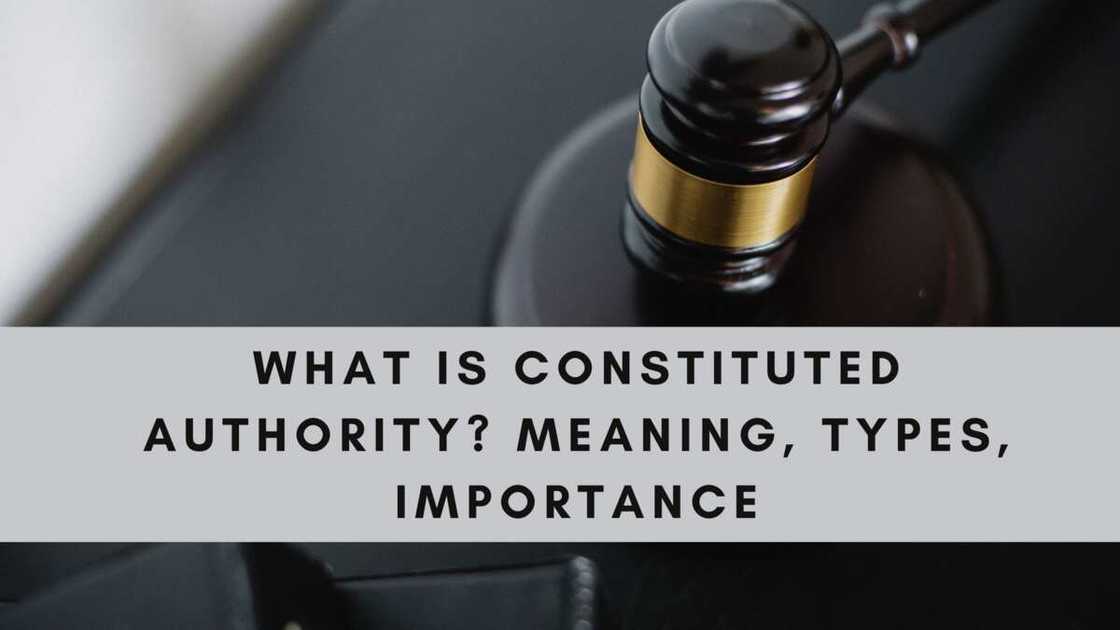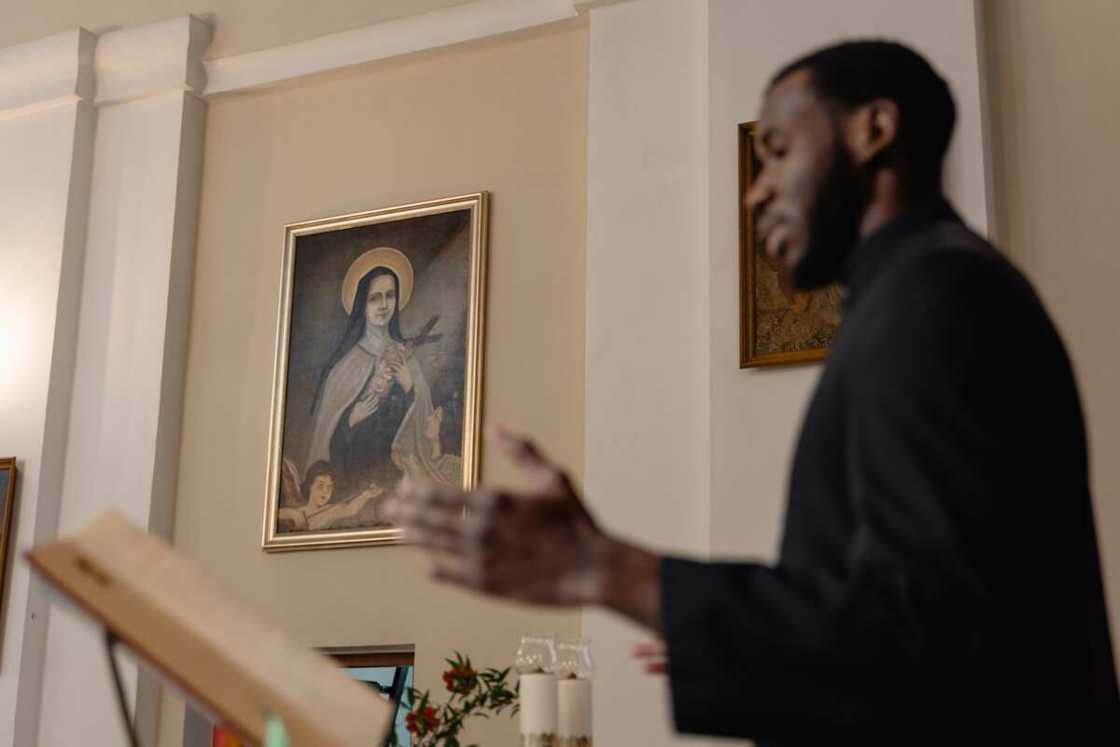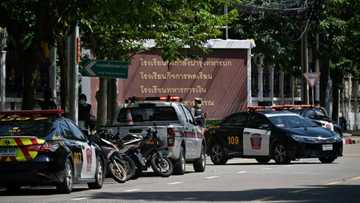What is constituted authority? Meaning, types, importance
Every country with a defined territory and government has a constitution. The constitution upholds the rights and freedoms of its people. It also ensures proper dispersion of power among different individuals and state organs. In Nigeria, people who perform specific roles for the good of all form the constituted authority.

Source: UGC
Through constituted authority, sovereign states and nations run smoothly. They have frameworks of laws and discipline that citizens and residents follow.
Meaning, types, and importance of constituted authority
Imagine what a state or country without laws would be like. It would be in anarchy, a state characterised by a disregard for human rights, property rights, and other freedoms. In sovereign nations, people understand the importance of respect for constituted authority.
What is constituted authority?
Constituted authority refers to a body given certain legal powers by the government. The body has specific goals and objectives and is mandated to exercise authority and control over people within the granted powers.
PAY ATTENTION: Сheck out news that is picked exactly for YOU ➡️ find the “Recommended for you” block on the home page and enjoy!
This means that constituted authority is made of elected or appointed people who hold specific offices. They are required by the government to follow and implement certain policies.
Their election or appointment into an office gives them legitimate power to serve society or fulfil specific obligations that benefit people. Leaders are supposed to be fair and treat every citizen and resident of the country equally. These leaders can be re-elected or re-appointed into office.
Examples
Examples of constituted authorities in Nigeria are listed below.
- The president: The head of state is the highest representative of the country. S/he appoints other leaders to various positions to help him/her implement the constitution.
- Governors: These are leaders in-charge of various states.
- The army: It protects the country from attacks and promotes peace in the country.
- Local chiefs: They ensure government services are provided at the grassroots level.

Source: UGC
What are the types of constituted authority?
There are four primary types of constituted authority, as explored below.
Democratic authority
This is the type practised in Nigeria and is mainly borrowed from democracy as practised in westernised nations. In this type, citizens of the country elect the president, governors, senators, and state house of assembly members.
On election day, people cast their votes. After counting, the winner is declared. The chosen leader is respected by all and is mandated to administer leadership and resources to everyone, regardless of who they voted for during elections.
In this type of authority, power lies in the people. Citizens bear the consequences of their choice of leadership. If a leader abuses their power, they can be rejected.
Charismatic authority
This form of authority mainly applies in religious settings. Muslim, Christian, and other religious leaders have specific duties. Their followers accord them respect and treat them with high regard.
Respect for constituted authority in the Bible, Quran, and other religious institutions is evident and encouraged. People of a particular religion are required to respect God Almighty and His appointed leaders, e.g. prophets, bishops, and sheikhs.
The behaviour of religious leaders is always under scrutiny. If they disobey the religion or abuse their powers, they can lose their positions or face divine wrath.

Source: UGC
Bureaucratic authority
Bureaucratic authority is common in Nigeria and is mainly practised in government organisations, for example, the civil service. In the system, officers are appointed by the civil service commision.
They are assigned various ranks in a defined hierarchy. The result is a unique organisational structure where people are promoted depending on their discipline, hard work, and vacancies available. In this form of leadership, there is a complex structure and official rules guiding decision-making.
Traditional authority
In this form of leadership, a community's traditions and culture are followed when picking leaders. Most traditional communities in Nigeria have an inherited type of leadership. This means that a leader got his powers from their father and will pass it down to their child.
Traditional leaders have specific duties and responsibilities. They have titles such as Chief, Oba, Obis, and Emir. It is not uncommon for traditional leaders to abuse their powers. It is challenging to dethrone those who do because their titles are either inherited or conferred on them.
Reasons why we need constituted authority
A community, sovereign state, or country without leaders is unlikely to thrive socially, economically, and politically. We need constituted authorities for the reasons described below.
- Maintenance of peace: Authorities ensure order and peace among people, e.g. traffic police officers ensure people abide by the traffic rules and regulations and sort scuffles that happen on the roads.
- Giving a sense of direction in society: Proper systems of leadership install a sense of direction in a country or community. Leaders guide people in achieving the set goals and objectives in society.
- Promoting the achievement of common goals for the good of everyone: Proper leadership systems ensure the welfare of all is safeguarded. Leaders are charged with the responsibility of providing for every member of society.
- Promoting oneness with God: Charismatic authority ensures people are close with The Almighty God.
- Citizen protection: The government ensures its people are protected from internal and external danger.
- Cultural preservation: Traditional authorities ensure the cultures and customs of the particular community are not eroded. They also assist the government in sensitising people on the need for cooperation with the government.
How can we show respect for constituted authority?
We can show respect for constituted authority in the following ways.
- Performing our obligations and duties as honest and upright citizens.
- Obeying the laws and regulations of the land.
- Respecting people in various positions of leadership.
- Not stealing or destroying government and personal property.

Source: UGC
What is a constituted authority?
Constituted authority means a body given specific legitimate powers by the government. The body must exercise authority and leadership over people within the granted powers.
What are the four types of constituted authority?
The four types are traditional, charismatic, organisational, and bureaucratic authorities.
What is the importance of constituted authority?
Constituted authority is important because it maintains peace and order among people, encourages oneness with God, gives a sense of direction in society, and promotes cultural preservation.
What are the constituted authorities in Nigeria?
There are numerous constituted authorities in the country. Examples are the president, governors, the civil service, the army, sheikhs, bishops, and traditional kings in various ethnic communities.
What are the examples of constituted authority?
Examples are traditional kings in various ethnic communities, religious leaders, the civil service, the presidency, and governors of various states.
Without constituted authority, anarchy would exist in Nigeria and other countries. Proper leadership systems allow a sovereign state to govern its affairs peacefully.
READ ALSO: 20 local governments in Lagos State and their headquarters
Legit.ng recently published a list of local governments in Lagos State and their headquarters. Lagos State is among the states with the highest population.
It is divided into 20 local government areas to ensure government services and resources reach ordinary citizens. The state is divided into two parts, the island and the mainland, to make service delivery possible.
Source: Legit.ng

Cyprine Apindi (Lifestyle writer) Cyprine Apindi is a content creator and educator with over six years of experience. She holds a Diploma in Mass Communication and a Bachelor’s degree in Nutrition and Dietetics from Kenyatta University. Cyprine joined Briefly.co.za in mid-2021, covering multiple topics, including finance, entertainment, sports, and lifestyle. In 2023, she finished the AFP course on Digital Investigation Techniques. She received the 2023 Writer of the Year Award. In 2024, she completed the Google News Initiative course. Email: cyprineapindi@gmail.com

Adrianna Simwa (Lifestyle writer) Adrianna Simwa is a content writer at Legit.ng where she has worked since mid-2022. She has written for many periodicals on a variety of subjects, including news, celebrities, and lifestyle, for more than three years. She has worked for The Hoth, The Standard Group and Triple P Media. Adrianna graduated from Nairobi University with a Bachelor of Fine Arts (BFA) in 2020. In 2023, Simwa finished the AFP course on Digital Investigation Techniques. You can reach her through her email: adriannasimwa@gmail.com






